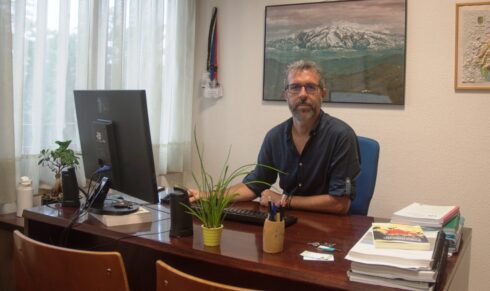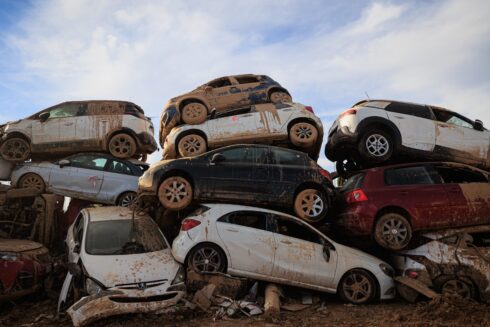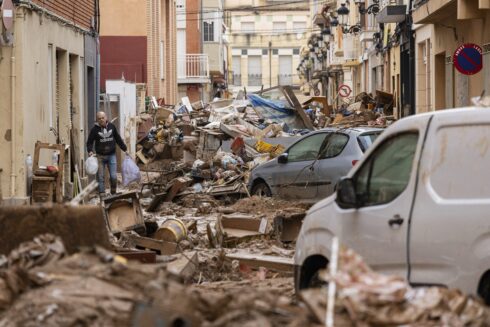IT is only a matter of time before the lethal floods that struck Valencia are repeated in other regions of Spain, a flooding expert has warned the Olive Press.
Antonio Gallegos, flooding expert at the University of Malaga (UMA) claimed the city was ‘lucky this time around’ but could soon face a catastrophic natural disaster.
The Geography professor told the Olive Press: “The intense rain in Valencia was extraordinary but it’s happening more and more.
READ MORE: Watch: Valencia local shows state of her ‘ground zero’ town 30 days after deadly DANA floods

“Luckily in Malaga we haven’t had such heavy rain yet, but if we do next year, which is probable, it will be the next Valencia.”
He explained that this time, rain on the Costa del Sol fell near the sea but if it moves inland, it will easily overwhelm water courses.
While some parts of the city did suffer flooding this year, ‘it will be a lot worse next time,’ if the rain was to fall just a little more inland.

“We haven’t implemented measures like making parks on floodplains designed to absorb water so we’re already late, these things have been urgent for years.
“Now that the tragedy in Valencia has happened, it has made us realise we need to act. Hopefully politicians will be proactive, it’s in their hands now.”
Malaga is not the only place in Spain that could be affected by extreme weather events.
“The Mediterranean is a maximum danger zone,” Gallegos explained.
“Floods are very serious here because the land doesn’t absorb water and rising sea temperatures make DANA storms more common and intense.”
READ MORE: Valencia region to bask in summer-like sun today as temperatures to reach 25C

This puts the Balearics, Murcia, Costa Brava and many other parts of Mediterranean Spain at high risk.
To avoid the devastation seen in Valencia, Gallegos says prevention and better disaster management are crucial.
“For many professionals, it never occurred to us that over 200 people could die in Spain in the 21st century as a result of a natural disaster. But in the case of Valencia, the management was very bad,” he said.
“Climate change caused the storm, but the lack of prevention and management is responsible for the consequences.”
Luckily, there are many things we can do to better face such challenges in the future, starting with a deep study of the failures in Valencia.
“The fact they didn’t give the warning until people were already drowning is something that needs to be studied because it is responsible for a large number of deaths,” said the environmental expert.
“We also need to redo maps and statistics of flood risk areas as they do not use contemporary data and only consider the flow of ‘clean water’ which does not overwhelm systems as quickly as the muddy, debris filled deluge that battered Valencia.”
Joaquin Martinez-Campillo Garcia, delegate of the Spanish College of Geologists in Valencia, agrees: “I hope Valencia is a turning point, but the cost has been too high. We need to take note, listen to the ecosystem and remember we are capable of preventing these situations.”

“A good example is Onteniente in the Valencian Community. They had very serious flooding and are modifying their river limits to make sure the water does not pick up such dangerous speeds.”
Another key action is educating flood zone residents how to react when warnings are issued.
“We need to educate; If we had done that in Valencia it wouldn’t have panned out the way it did. People kept going about their daily lives because they didn’t know otherwise. When you get a red alert, don’t think about your job or deadlines, think about saving yourself and your loved ones.”
Climate scientist Dr Anabela Bonada, works tirelessly on such education courses in her native Canada.
She is the Managing Director of the Intact Centre on Climate Adaptation, which develops guidelines to mitigate extreme weather risk.

“A lot of people think that because they don’t live near water that flooding can’t affect them, but with climate change that is changing so it’s very important to be aware,” she advised.
“There are some simple things you can do to mitigate your risk such as cleaning out your gutters, ensuring your downspout is directed away from the home or adding a rain garden to absorb excess water.”

If you live in a flat, as many people do in urban Spain, she advises keeping an emergency grab bag filled with supplies to sustain you for at least 72 hours such as water, food, a torch and medicine.
She also recommends knowing where your nearest high ground is and where you keep your valuables in case of an emergency.
“But ultimately, the responsibility for this awareness raising falls heavily on the government’s shoulders,” she said.
“Likewise, they need to improve the alert system and stop building on floodplains.”
Spain partially banned construction on floodplains in 2015, but developers can still build on some of this land if certain ‘safety conditions’ are met.
Thousands of people also live on floodplains built before this law came into place, especially on the Mediterranean coast where huge property booms led to heavy urbanisation of coastal flood zones.
Indeed, the Balearics government earlier this year approved a change in the law to permit even more construction on flood plains. This local legislation has now been frozen following the Valencia disaster, while all political parties discuss modifications.
Despite the fear many Spanish residents are feeling right now, Dr Bonada encourages a healthy optimism.
“Things need to be done differently, but we have the solutions, so for me that provides hopeful optimism,” she shared.
“But we also need to be proactive, if we want these actions to be implemented, it’s up to all of us to push for it and vote for a government that we know will implement these actions.”The Intact Centre on Climate Adaptation provides a wealth of advice, guides and resources on how to prepare for natural disasters on their website: www.intactcentreclimateadaptation.ca.
READ MORE: Spain announces huge new aid package for flood-ravaged Valencia
Click here to read more Spain News from The Olive Press.








